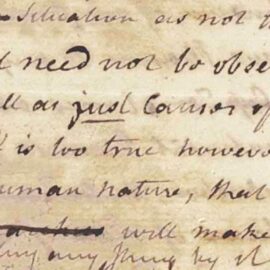

This article is an excerpt from the Shortform book guide to "The Autobiography of Malcolm X" by Malcolm X and Alex Haley. Shortform has the world's best summaries and analyses of books you should be reading.
Like this article? Sign up for a free trial here.
How did Malcolm X and Elijah Muhammad become allies? Why did they later become enemies? What changed?
Malcolm X joined the Nation of Islam when he was in prison in his early 20s. Elijah Muhammad was the leader of the movement at the time, having succeeded founder W. D. Fard. What began as an alliance between Malcolm X and Muhammad eventually turned into a bitter division between these two leaders.
Read more to learn about the relationship between Malcolm X and Elijah Muhammad.
Malcolm X and Elijah Muhammad: Allies
Malcolm X and Elijah Muhammad connected after Malcolm X joined the Nation of Islam and began corresponding with Muhammad. The Nation of Islam’s teachings posited that white people are the devil and that they’ve perpetrated evil against Black men by cutting them off from their ancestral cultures and convincing them of white superiority. Malcolm X explains that, according to this belief system, the different races were purposefully created by a scientist named Yacub through eugenic engineering, and the white race was supposed to rule the world for 6,000 years before Black people (who were the original and naturally superior race) would ascend to the top.
(Shortform note: Now considered a hate group, the Nation of Islam’s origins are shrouded in mystery: There’s been much speculation about the race, birthplace, and teachings of founder W. D. Fard, who disappeared in 1934. More is known about Elijah Muhammad; experts say that in Fard’s absence, he stepped up as a stronger leader with even more divisive teachings, including the myth of Yacub. Some scholars say that according to the myth, Yacub deceived Black women in order to create the white race—and that deception was why white people were supposedly inherently evil. Pseudoscientific claims like these have often been used to justify racist beliefs—this is known as scientific racism—though the majority of these beliefs are pro-white.)
Malcolm X explains that he was prepared to accept these teachings as the truth because he knew that the way he had been living was wrong—this seemed a viable alternative. To convert, he first stopped smoking cigarettes and eating pork. He then wrote to Elijah Muhammad, who welcomed him to the religion and told him that he was living proof of white men’s devilish nature—since they deprive Black men like him of opportunities and force them to become criminals to survive. The two began to write to each other frequently, which is how Malcolm X learned more about the religion.
After his release from prison, Malcolm X traveled to Chicago to meet Elijah Muhammad and, under Muhammad’s guidance, set to work recruiting new members and building the religion. He tripled temple membership in Detroit within a few months and went on to establish new temples in Boston, Philadelphia, Springfield, and Atlanta. Because of Malcolm X’s success, Muhammad named him head minister of Temple Seven in New York City.
(Shortform note: Experts have concluded that Malcolm X was personally responsible for the Nation of Islam’s gains in popularity. The organization grew under Muhammad, but it lost steam after Muhammad was imprisoned for telling followers to dodge the draft during World War II. Recruitment didn’t pick back up again until Malcolm X began working on the organization’s behalf. Experts have pointed to his strong leadership skills, like an aptitude for public speaking, to explain Malcolm X’s monumental success in building the Nation of Islam.)
Malcolm X and Elijah Muhammad: Enemies
Malcolm X gained prominence that other Nation of Islam leaders didn’t—and he explains that, eventually, Elijah Muhammad became jealous of him. He made Malcolm X the first National Minister of the organization and praised him to his face; all the while, he told others Malcolm X was untrustworthy and that he’d betray the Nation of Islam. But Malcolm X came to know that Muhammad was the untrustworthy one: He’d been having adulterous affairs with his secretaries, who became pregnant and were harshly punished for it.
Eventually, some of those secretaries filed a paternity lawsuit against Muhammad, and Malcolm X spoke to them himself to discover the truth. He’d been hearing rumors about Muhammad’s adultery for years, but his respect for the man and dependence on his teachings had prevented him from believing them. After talking to the secretaries, he was convinced—but still loyal. He brought his concerns directly to Muhammad, who told him that he had only fulfilled a prophecy, and Malcolm X prepared other ministers to teach about prophecy fulfillment so that followers wouldn’t be upset by Muhammad’s guilt when word inevitably got out.
Their relationship would end only after President John F. Kennedy was killed. Muhammad told ministers not to comment on it—but Malcolm X did anyway, arguing that the assassination was a punishment for JFK’s wrongdoing. For his disobedience, Muhammad sentenced Malcolm X to 90 days of silence and alerted the news to the punishment. That made Malcolm X suspicious of him—and eventually, it became clear to him that Muhammad wanted him dead. Malcolm X explains that he felt more disturbed by Muhammad’s betrayal than by the threat of violence because he had been so devoted to Muhammad and the cause that he was willing to die for them—the fact that Muhammad would rather lie than come clean destroyed his faith.
Muhammad did indeed want Malcolm X dead—he assigned someone to kill him, but that person respected Malcolm X and told him about the plan instead. At that point, Malcolm X knew he had to give up on the Nation of Islam—but he wasn’t willing to give up on civil rights activism. He created his own organization called Muslim Mosque, Inc. (MMI), which he hoped would embrace Black people of all religions and lift them out of their plight. He notes that many members of the Nation of Islam left to join his organization.
| How Elijah Muhammad’s Misdeeds Made Malcolm X His Enemy Other sources, including the FBI and subsequent accounts made by Malcolm X, have clarified that many of Elijah Muhammad’s partners were underaged girls. Malcolm X kept relatively quiet about this information until Elijah Muhammad attempted to evict him from the house he’d been provided by the Nation of Islam, at which point he took his accusations to the press and clarified that Muhammad had fathered at least eight children with six teenage girls. Malcolm X later explained that he believed that making these public accusations endangered his life because it threatened the power of the Black Muslim movement. Malcolm X also explained in a later televised interview that Muhammad would try to excuse his actions by saying that as a Muslim, he was entitled to have multiple wives—and some scholars agree that Muhammad considered these extramarital partners his “secret wives.” However, Malcolm X argued that if they were legitimate wives, under Islamic tradition, Muhammad would’ve had to treat them with respect—instead, he publicly humiliated them and forced them into isolation. Experts say that according to Islamic scripture, a man can only have up to four wives—if he can provide for them all. In contrast, Muhammad was involved with at least seven women, with whom he had a total of 13 illegitimate children. Experts say that another major disagreement that led Malcolm X to break with Muhammad was how to handle a police attack on several Black Muslims in Los Angeles that resulted in the death of Ronald Stokes. Malcolm X wanted to launch a counterattack, but Muhammad warned him not to—and shamed the attacked Muslims for allowing the police to enter their mosque and continue the violence. Malcolm X was frustrated by Muhammad’s response and his general refusal to allow the Nation of Islam to engage publicly in civil rights activism—so instead of a counterattack, Malcolm X went on a speaking tour and turned Ronald Stokes into a martyr, symbolic of the white establishment’s continual violence against Black Americans. While these were the straws that broke the camel’s back, Malcolm X’s rupture from the Nation of Islam may have begun much earlier, with a 1961 meeting with the KKK. The Nation of Islam shared with the KKK a belief in keeping the races separate, and Muhammad wanted Malcolm X to ask for the KKK’s assistance in acquiring land for a self-sovereign Black state. Malcolm X despised the KKK and hoped instead to verbally annihilate them in this meeting—and he became disillusioned with the prospect of collaboration entirely after the KKK suggested that they work together to kill Martin Luther King, Jr., Malcolm X threatened to expose the Nation of Islam’s affiliation with the KKK shortly before his death. Despite being disappointed in Muhammad’s leadership and ultimately breaking away from the Nation of Islam, Malcolm X still expressed some loyalty to Muhammad—even after Malcolm X had created his own organization, MMI. In one 1964 interview, he explained that he believed Muhammad had a perfect understanding of racism and its only solution—Black nationalism—and that the purpose of establishing the MMI was to carry out that solution without hindrance, in collaboration with any Black person of any religious belief (or lack thereof). At this point, he still held Muhammad in high esteem—but later, he would completely renounce Muhammad and his belief system. |

———End of Preview———
Like what you just read? Read the rest of the world's best book summary and analysis of Malcolm X and Alex Haley's "The Autobiography of Malcolm X" at Shortform.
Here's what you'll find in our full The Autobiography of Malcolm X summary:
- Malcolm X explains why he believed what he believed
- The historical and sociological context surrounding Malcolm X’s life
- Why Malcolm X was such a controversial figure






